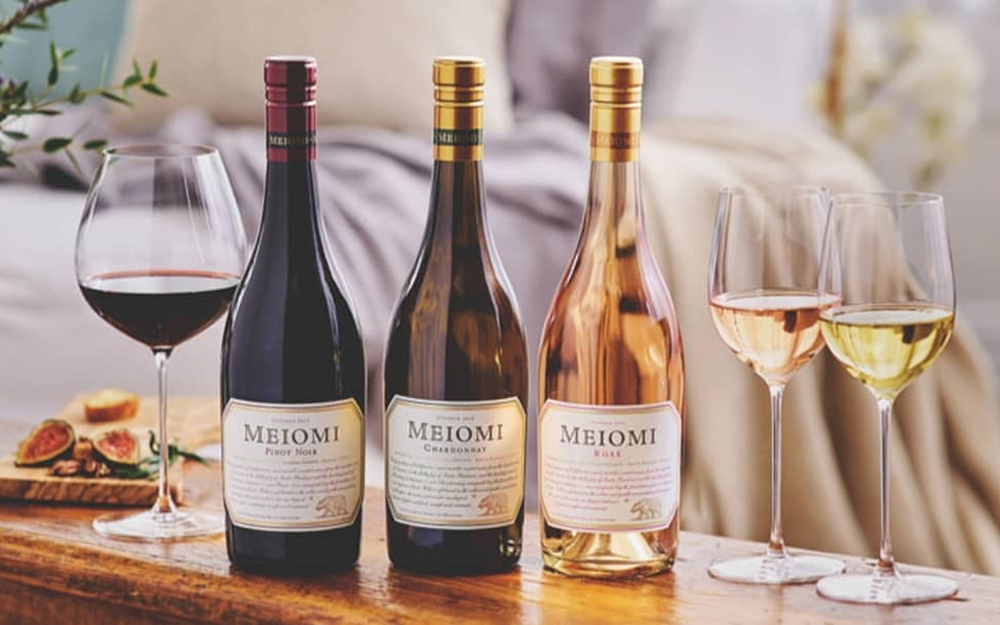
By Rick Riozza
Anyone drinking any amount of wine in the past few years no doubt knows of the Meiomi brand. And most of these folks have indeed tried the wine—especially the Meiomi Pinot Noir, which has a following in the millions.
And I mean a loyal following: When I was working at Total Wines in Palm Desert, a beaucoup amount of cases of Meiomi Pinot Noir went out the door on a daily basis. Unfortunately for us wine stewards and salespeople, the management would strongly suggest for us to recommend their “Winery Direct” wines instead, which included Verada, River Road, and the like, when the customers asked for their favorite Meiomi. As you could imagine, we saw a lot of rolling of the eyes!
Meiomi’s Pinot Noir became so popular for a couple of reasons or so: (And—keep in mind, the heavens were perfectly aligned.)
The young winemaker Joseph “Joe” Wagner, a member of Napa Valley’s Wagner Family of Wine (founders of famed Caymus Vineyards), developed Meiomi while working for the family. He perfected an extremely popular flavor profile. It offered bright, berry-rich sweetness, which Americans historically love, plus balance and food-friendliness. In 2006, Joe created a label that was accessible and reliable. And it was an affordable California pinot at exactly the time when everyone in America wanted affordable California pinot.
Two years prior, “Sideways,” the 2004 film in which two middle-aged white guys drink wine and re-evaluate life against a picturesque backdrop of the Santa Ynez Valley’s rolling hills, made California Pinot Noir a national obsession. Prior to that time, California Pinot was pricy and a third or fourth choice for wine drinkers. “Nobody cared about Pinot Noir [before ‘Sideways’],” Wagner said, “After its release, all bets were off, and you couldn’t make enough Pinot. [It] changed the dynamics of the industry for Pinot Noir.”
Meiomi sold 90,000 cases by 2010 — not bad for a label less than five years old. But by 2015, Meiomi sold 700,000 cases annually! Wagner who recently agreed to sell the Meiomi brand of California wine to Constellation Brands for almost a third of a billion dollars said the transition came at a time when his company faced a high hurdle: continuing to make enough wine to fill fast-growing demands that may move to a million cases. Constellation is as big as a constellation in the wine biz; they have the where with all to comply with the demand.
According to Wagner, Meiomi, which is pronounced “mey-ohm-mee”, not “Mee-Oh-My,” means “coastal” in Wappo, the language spoken by the indigenous people of Northern California. Thus, coastal vineyards are still kept in mind, and with Constellation at the helm of the Meiomi brand, we now have a portfolio that includes Chardonnay, rosé, and a bubbly sparkler.
Having the pleasure to taste through the recent vintages of the Meiomi portfolio, here are my findings: Impressive.
I will admit that a few years ago, I found the Meiomi Pinot Noir to be a bit overly-sweet—not sugar sweet but fruity sweet. And that was almost a consensus of us wine snob columnists. But where some remain “haters”— either due to the fact that it had let some snobs down, or, that so much money was made on the deal & why can that happen, but some of us re-tasted (I mean we’re not all that snobbish) and found the recent Meiomi Pinot Noir to be very good again.
2017 Meiomi Pinot Noir: It’s interesting that this pinot still garners the headlines. Everyone in town is eager not only to taste but to talk about the wine: And that is absolutely fine for Constellation wines. Wagner reportedly advised Constellation on winemaking during the transition; and new winemaker Melissa Stackhouse notes that this is a wine made for pure enjoyment, laughter and time spent with friends.
All right then: we have a socially acceptable wine that’s world famous. I was pleasantly surprised and happy about it. I like the bright strawberry, mocha java, and vanilla oak aromas; I like the dark cherry, boysenberry, blackberry fruits and the clove, cedar, and the touch of bitter tea notes in the palate. It was delicious with our pasta Bolognese.
2017 Meiomi Chardonnay—I’m tasting this wine as I write. The nose is like that of a high-priced Chard; very nice with yellow pear dominating the aromas with a little citrus zest, sea salt, and Marcona almonds on the cusp. That makes for a fun anticipation of the quaff: The light-medium body is smooth wine with light layers of pineapple and lemon peel and some custard notes. There is also an agreeable bitter note of dried herbs that add to the complexity; food worthy acidity for the folks who are now enjoying a Chardonnay with acidity and a clean mineral driven finish. It has a perfect alcohol level at around 13.6%. Very good stuff!
Meiomi Rosé is delicately pink in color and delightfully dry with vibrant acidity. It was the hit of our Easter dinner. It was so dry and crisp that if someone would have tricked me to thinking it was a French Provincial wine, I’d probably run with it. (Whispering Angel: you’ve got local competition). Aromas of watermelon, orange peel, and subtle hints of rose petal on the nose, the palate offers lush flavors of stone fruit and strawberry with a cool minerality on the finish.
Meiomi Sparkling Wine—We tasted this bubbly at the Palm Desert Food & Wine. Made in the same method as French Champagne, this 60% Chardonnay and 40% Pinot Noir wine is elegant with well-structured bubbles that delight the palate. It’s very impressive with aromas of green apple and hints of peach nectar. Everyone agreed that it was like crunching on Granny Smith apples with citrus zest following. With flavors of slight yeastiness and fresh minerality, enjoy this sparkling wine with fresh oysters topped with a classic mignonette sauce, sushi, warm brie, or a fresh mixed berry tart. Cheers!










































